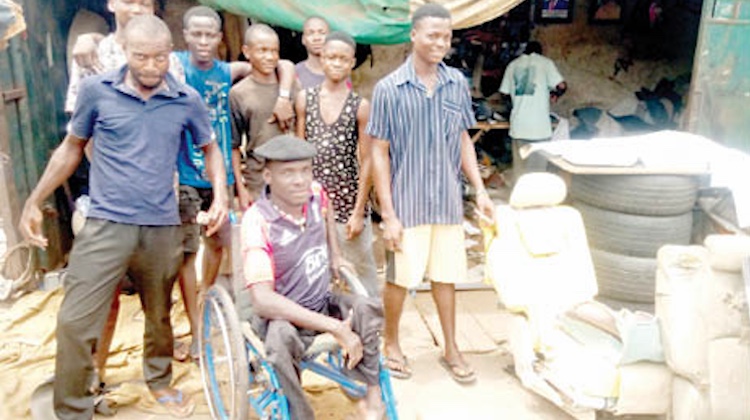
In a quiet corner of Benin City, Nigeria, there’s a small upholstery shop where the hum of sewing machines blends with the sound of determination.
Inside, you’ll find Solomon Umudi sitting in his wheelchair and leaning over a car seat, his hands moving with precision, transforming worn interiors into polished perfection. But don’t feel pity for the craftsman, known around town as “Golden Boy.” He’s not here for sympathy. He’s here to build.
Born healthy, Solomon’s life changed drastically after a childhood immunization left him physically disabled. That twist of fate could have derailed him, but it didn’t. Instead, it became the fuel behind a life defined by grit. “I don’t see myself as disabled,” he says. “Whatever an able-bodied person can do, I believe I can do it too.” That mindset has carried him through decades of challenges most people never see — and it’s helped him carve out a respected name in Nigeria’s upholstery scene.
Back in the late ’80s, Solomon finished secondary school knowing college wasn’t an option. His family didn’t have the means, and his condition made everyday life difficult. But one thing he did have was a deep curiosity about craftsmanship, especially upholstery. While others might have dismissed it as a trade too demanding for someone with a disability, Solomon leaned in. He found a mentor — who was also physically challenged — and began his apprenticeship.
Getting to the workshop each day was a feat in itself. Without money for transport, Solomon wheeled himself over an hour each way, rain or shine. “I made sure to leave by 6:30 in the morning,” he remembers. It was tough, but he kept showing up — day after day, year after year — sharpening his skills, learning not just how to sew, but how to build a future with his hands.
After years of training to hone his skills, Solomon opened his own shop in 2001 with ₦30,000 ($19.14) — money he raised through a combination of begging, donations and help from his church community. He bought one sewing machine and started small. Today, he’s running a full-fledged business with staff, apprentices, and a reputation for detail-driven work that speaks for itself. His seats are tight. His stitch lines are clean. His clients come back.
Perhaps the most impressive part of Solomon’s story isn’t the quality of his work, but his generosity. He trains all his apprentices for free, a tribute to his late master who did the same. “My late master didn’t charge me, so I do the same to honor his legacy and encourage the youth,” he says.
His workshop is full of stories like his, apprentices who came in with little more than ambition and are now building careers. One employee, Dadison Innocent, recalls how Solomon took him in without asking for anything. “He even buys me food when I’m hungry,” he says.
Solomon’s impact goes beyond the shop. He’s a husband and father of six. Two of his children are already in university, and he’s making sure each of them learns a skill — from hairstyling to fashion design to upholstery — so they can succeed, just like he did. Even when foreign companies in Dubai and Spain offered him jobs, Solomon turned them down. “I want to be present to guide them,” he says.
He’s used his earnings — an average of ₦200,000 a month ($127.58 USD) — to build a house, buy a car and support his family’s education. Still, like many small business owners in Nigeria, he faces constant challenges. Electricity is a major issue. For months at a time, there’s no power, and running a generator drains profits. Solar systems capable of supporting his equipment are out of reach financially, and government support is scarce.
Despite the roadblocks, he’s not bitter. He’s proud. “I don’t regret anything,” he says. “I may not have legs like others, but I have skills. That’s enough.”
Whether your struggles are financial, personal, or physical — Solomon’s story is a powerful reminder that skill, vision and determination can turn even the toughest road into a path forward.
For the full story of Solomon Umudi’s remarkable journey, visit Daily Trust.
Recent Comments